- Home
- Deborah Harkness
Time's Convert Page 40
Time's Convert Read online
Page 40
Words leaped out at him from the smudged newsprint.
Nothing so good to stop the progress of the yellow fever as the firing of cannon.
“Christ, no,” Marcus said. Yellow fever was a terrible disease. It spread like wildfire in the city, especially in summer. People turned jaundiced, and spit up black and bloody vomit as the fever poisoned their bellies.
The College of Physicians having declared that they conceive FIRES to be very ineffectual, if not dangerous means of checking the progress of the prevailing fever . . .
Marcus scrambled through the rest of the mail looking for a later Philadelphia paper, but that was the only one. He did, however, locate a copy of Providence’s United States Chronicle that bore a later date, and scoured it for an update on the situation to the south.
“We are all much alarmed by the rapid progress a putrid fever is making in this city,” Marcus read aloud. “There is no accounting for it.”
Marcus had grown up under the shadow of smallpox, had fought cholera and typhus in the army, and had grown accustomed to the febrile perils of urban life in Edinburgh and London. As a vampire, he was immune to human disease, which made it possible for him to treat the sick and observe the progress of an epidemic even after his warmblooded colleagues had sickened, abandoned their charges, or died. These accounts in the American newspapers marked the beginning of a cycle of death with which Marcus had grown familiar. There was little chance that matters in Philadelphia had improved. The city would have been ravaged by yellow fever between late August and the present moment.
He picked up the letter. To Doc, in England or France. The letters bobbed up and down like the waves.
It was from Adam Swift, and contained only one line.
I’ve left you my books, so don’t let those bastards take them for taxes.
“Which way did Gallowglass go?” Marcus said, gathering up the newspapers and the letter.
“To Dover, of course. Here, take these, too.” Baldwin held out some ledgers. “You’ll need them in Hertfordshire.”
“I’m not going to bloody Hertfordshire,” Marcus said, halfway out the door. “I’m going to Philadelphia.”
* * *
—
PHILADELPHIA’S STREETS WERE QUIET when Marcus arrived in early November. As usual, the westward crossing took far longer than the voyage from America to England. Marcus had driven Gallowglass and his crew mad with constant questions about speed and distance, and how much longer it was going to take.
When they arrived, Gallowglass ordered all the warmbloods to remain on the ship, and left the ship itself anchored well outside the harbor. It had been months since Gallowglass had last been in Philadelphia; there was no telling in what state they would find the city. Gallowglass rowed the distance from where he’d dropped anchor to the Old Ferry Slip between Arch and Market Streets. The wharves were empty, the only ships barren of crew and sails.
“This doesn’t look good,” Gallowglass said darkly as they tied up the skiff. As a precaution, his cousin took one of the oars and slung it over his shoulder. Marcus had a pistol and a small bag of medical supplies.
“Jesus and his lambs,” Gallowglass said, pinching his nose shut as they turned down Front Street. “What a stench.”
This was Marcus’s first time back in Philadelphia since he had become a vampire. The city had always smelled bad. But now—
“Death.” Marcus gagged. The odor of rotting flesh was everywhere, replacing the more familiar fumes from the tanneries and the everyday filth of urban life. There was a strange, sharp tang in the air as well.
“And saltpeter,” Gallowglass said.
“Please.” A waif approached them wearing nothing but a smock and one shoe. It was impossible to tell whether the child was male or female. “Food. I’m hungry.”
“We have none,” Gallowglass said gently.
“What’s your name?” Marcus asked.
“Betsy.” The child’s eyes were huge in a face that was miraculously pink and white, with no sign of yellow fever. Marcus put his pistol in his belt and picked up the child. There was no scent of death on her.
“I’ll get you some,” Marcus said, heading toward Dock Creek.
Like the area around the wharves, the busy streets were strangely empty. Dogs ran wild, and there was the occasional snuffle of a pig. Piles of manure rotted on corners, and market stalls were abandoned. It was so quiet that Marcus could hear the creaking of the rigging on the masts of the ships. There was a steady clop of horses’ hooves on cobbles. A wagon came into view. The driver had pulled his hat low, and wore a kerchief over his nose and mouth. He looked like a highwayman.
The wagon carried dead bodies.
Marcus turned the child away from the sight, though he suspected she had seen worse.
As the driver came closer, Marcus saw that his skin was black and his eyes weary.
“Are you sick?” the man called out, his voice muffled.
“No. We’ve just arrived,” Marcus said. “Betsy needs food.”
“They all do,” the man said. “I’ll take her to the orphanage. They’ll feed her there.”
Betsy clung to Marcus.
“I think I’ll take her to German Gerty’s instead,” Marcus said.
“Gert’s been gone for years.” The driver’s eyes narrowed. “You seem to know a lot about Philadelphia for someone who just arrived. What did you say your name was?”
“He didn’t,” Gallowglass replied. “I’m Eric Reynold, captain of the Aréthuse. This is my cousin, Marcus Chauncey.”
“Absalom Jones,” the driver said, touching his hat.
“Is the fever gone?” Marcus asked.
“We thought so. There was some frost a few days ago, but the weather turned warm again and it’s back,” Jones said. “The shops were just opening and people coming back to their houses. They even flew the flag over Bush Hill to show there weren’t any more sick people in it. There are now.”
“The Hamilton estate?” Marcus dimly remembered the name of the mansion outside the city.
“Been vacant for years,” Jones replied. “Mr. Girard took it over when the fever struck. This is one of his wagons. But these folks aren’t going to the hospital. We’re headed to potter’s field.”
Marcus and Gallowglass sent him on his way. They settled Betsy down on the street, each taking one of her small hands. She skipped between them, crooning a song, a testament to the resilience of children.
The tavern that Marcus had known as German Gerty’s was still on the corner of Front and Spruce Streets. Dock Creek, however, had been paved over and was now a narrow, twisting alleyway that jutted off at an angle across Philadelphia’s regular street plan.
The door was open.
Gallowglass gestured to Marcus to stay where he was and stuck first his oar, then the rest of him, inside the dark interior.
“It’s all right,” Gallowglass reported, sticking his head out a window. “Nobody here but some rats and someone who died long before August.”
To Marcus’s astonishment, the skeleton was still sitting in the front window, though he had lost his left radius and ulna. His left hand was perched rakishly atop his head.
They searched high and low for food, but found none. Betsy’s lips started to quiver. The child was famished.
Marcus heard a snick.
“Stop there.”
He turned, his hands up in the air.
“We’re not here to rob you,” Marcus said. “We just need some food for the girl.”
“Doc?” The man standing before them holding a musket in his trembling hands looked like something out of a cartoon, a caricature of a human being with yellow skin, blackened lips, and red-rimmed eyes.
“Vanderslice?” Marcus lowered his hands. “Christ, man. You should be in bed.”
“You came. Adam sa
id you would.” Vanderslice dropped the gun and began to weep.
* * *
—
THEY GOT VANDERSLICE UPSTAIRS, where they found stale bread that had not yet gone moldy, a bit of cheese, and some beer. They settled Betsy in a corner as far away from Vanderslice’s bed as possible. It was covered with vomit and flies. Marcus stripped the bed and tossed the sheets and blanket out the window.
“He’s better off on the floor,” Marcus said tersely when Gallowglass started to lower Vanderslice onto the mattress.
Gallowglass and Marcus used their coats to make a pallet, and Marcus cleaned up his friend as best he could.
“You look good, Doc,” Vanderslice said, his eyes rolling around with fever. “Death suits you.”
“I’m not dead, nor are you,” Marcus replied. He held some of the beer up to Vanderslice’s lips. “Drink. It will help with the fever.”
Vanderslice turned his head. “Can’t. It burns going down, and it burns worse coming up.”
Gallowglass shook his head at Marcus. This is hopeless, his expression read.
But Vanderslice had been the first to make room for Marcus beside a campfire when he was frozen and starving and on the run from his ghosts. It was Vanderslice had shared food with him, and his blanket, at Trenton. Vanderslice had whistled Christmas songs when he was on patrol duty, no matter the season, and told bawdy jokes when Marcus’s spirits were low. When Marcus had been utterly alone in the world, afraid and without kith or kin, Vanderslice had accepted him like a member of his family.
Marcus might have killed his own father, but he had no intention of losing Vanderslice. He’d lost enough—his home, his mother and sister, countless patients, Dr. Otto, and now Veronique.
Marcus wanted someone to belong to again. Someone who would restore his faith in family after Obadiah and the de Clermonts had made him doubt the bonds of blood and loyalty.
“I can make the burn go away,” Marcus said. He crouched down next to his friend—his brother.
“No, Marcus,” Gallowglass said.
“It will hurt like hell at first, but you won’t feel much pain after that,” Marcus continued, as if his cousin hadn’t spoken. “It takes a bit of getting used to, but you’ll have to drink blood to survive. And you’ll have to learn to hunt. You never could bait a fishhook, never mind bring down a deer, but I’ll teach you.”
“Have you lost your fucking mind?” Gallowglass grabbed Marcus by his collar and hauled him to his feet. “You’re too young to start a family.”
“Let go of me, Gallowglass.” Marcus’s voice was even, but he was prepared to strangle the man if his cousin refused. The more time that passed, the more obvious his choice became and the more resolute he was to save Vanderslice’s life. “I’ve ripened now, you see, and I may not be your equal in size, or strength, or age, but that’s been true my whole life.”
Marcus’s intentions must have been clear in his expression. Gallowglass dropped him with a blistering oath that had Vanderslice wheezing with appreciation.
“He reminds me of that French kakker,” Vanderslice said. “What was his name? Beauclere or du Lac or something like that.”
“De Clermont,” Matthew and Gallowglass said in unison.
“That’s it. De Clermont. Wonder whatever happened to him?” Vanderslice said. “Probably got his head chopped off in France, along with his friend.”
“They’re both still alive, actually,” Marcus said. “The chevalier de Clermont saved me at Yorktown. I had a fever, like you.”
Vanderslice looked at Marcus skeptically. “Not even you can save me, Doc. I’m too far gone.”
“Yes I can,” Marcus said.
“Wanna bet?” Vanderslice was always up for a wager.
“Don’t do it, Marcus,” Gallowglass warned. “For the love of God, listen to me. Matthew was never supposed to make any more children, and you’ve promised not to do it, either. Granddad said—”
“Bugger off, Gallowglass,” Marcus said pleasantly. He was watching Vanderslice closely, and though he was lucid now, his heartbeat was skipping faster than Betsy had on her way to the tavern, and his breath was shallow. “Take Betsy with you.”
“If you break your word to Philippe, you’ll regret it,” Gallowglass said.
“He’ll have to find me first,” Marcus replied. “No man’s reach is indefinite, Gallowglass.”
“I thought that—once. We all believed it, once.” Gallowglass told him. “And we all learned better.”
“Thank you for bringing me to Philadelphia. Please tell Ysabeau where I am.” Marcus knew that so long as his grandmother knew where he was, Matthew would find out. And if Matthew knew, then he would inform Veronique—if she were still alive, that is. Marcus could do nothing to save Veronique, but Vanderslice was another matter.
“And that’s it. Thanks, and don’t let the door hit you on the arse on your way out?” Gallowglass snorted. He beckoned to Betsy, who was listening to their conversation with interest. “Come, lass. Let’s let these two brew up their cup of disaster and drink from it, while we take a walk and look for your mam.”
“Mumma’s sleeping,” Betsy said.
“We shall see if we can rouse her,” Gallowglass said, taking her by the hand. “You best wake up, too, Marcus. You can’t be turning everybody you love into wearhs. It’s not how the world works.”
“Good-bye, Gallowglass.” Marcus looked over his shoulder. “And I meant what I said. Thank you for bringing me to Philadelphia.”
Fever or no fever, this was where Marcus was supposed to be. Here, in this familiar place where he had saved some lives and been saved by Dr. Otto’s faith in him and the Associators’ friendship. Here, in Philadelphia, where he had drunk in the atmosphere of liberty and freedom in that heady summer of 1777.
When the sounds of Gallowglass’s heavy footsteps and Betsy’s piping voice had faded, Marcus looked down to discover that Vanderslice was studying him.
“You look exactly as you did fifteen years ago,” Vanderslice said. “What are you, Marcus?”
“A vampire.” Marcus settled back against the edge of Vanderslice’s filthy bed. “I drink blood. Animal blood. Human blood, too. It keeps me from aging. It keeps me from dying.”
Vanderslice’s eyes flickered with fear.
“Don’t worry. I’m not going to drink yours—unless you want me to take it all, so that I can give you back some of mine in exchange.” Marcus was determined to do a better job of explaining what was about to happen to Vanderslice than Matthew had done with him, and drew on what Gallowglass had told him on board the Aréthuse. “Humans aren’t the only creatures in the world, you see. There are vampires, like me, who drink blood. There are also witches, who wield unspeakable power. They can die, though, just like humans. So can daemons. They’re really clever. I thought you might be a daemon, but you don’t smell like one.”
Marat had smelled like fresh air and electricity, as if one of Dr. Franklin’s experiments had come to life.
“Daemon?” Vanderslice’s voice was faint.
“I like daemons,” Marcus said fondly, still thinking of Marat. “You would, too. Never a dull moment when there are daemons around. Vampires can be a bit unimaginative.”
Vanderslice wiped the back of his hand across his mouth. It came away black and bloodied. He examined it for a moment, then shrugged.
“What have I got to lose?” Vanderslice said.
“Not much,” Marcus admitted. “You’re going to die either way. The only difference is that if I take your life before the fever does, you can drink my blood and probably survive. No guarantees, though. I’ve never done this before.”
“That’s what you said to Cuthbert when you cut that wire out of his thumb,” Vanderslice said. “He did all right, as I remember.”
“If you come out of this alive, you’ll have to tell me all ab
out Cuthbert, and Adam’s last days, and even Captain Moulder,” Marcus said. “Deal?”
“Deal,” Vanderslice replied with a hint of his old grin. “But only if you return the favor and tell me stories of France.”
“I met Franklin, you know,” Marcus said.
“No!” Vanderslice began to wheeze again. This time, the laughter turned to coughing, the coughing to vomiting, and the vomit was blackly red.
“You sure, Claes?” Marcus had never called Vanderslice by his given name, but this seemed like the moment to do it.
“Why not,” Vanderslice replied.
“I’ve got to bite you first, to take your blood,” Marcus explained, just as he had once explained inoculation to the soldiers at Trenton. “Then I’ll drink every drop of it.”
“Won’t you get sick with the yellow fever if you do?” Vanderslice asked.
Marcus shook his head. “No. Vampires don’t get sick.”
“Sounds good to me,” Vanderslice said wearily.
“You might get scared when I bite you, but try not to fight me. It will be over before you know it,” Marcus said, using his best bedside manner. “Then I’ll ask you to take my blood. Drink as much of it as you can. You’ll see things—all sorts of things. Betsy and Gallowglass, my voyage here on the ship, the chevalier de Clermont. Don’t let that stop you. Just keep drinking.”
“Any pretty girls?” Vanderslice said.
“A few,” Marcus said. “But one of the prettiest is your great-grandmother, so no lewd thoughts.”
Vanderslice crossed his heart with trembling fingers. “Then what happens?”
“Then we figure out how we’re going to survive in a city full of dead people until it’s safe to move you somewhere else.” Marcus figured there was no point in being anything less than honest. “You ready?”
Vanderslice nodded.
Marcus took his friend into his arms. He held him close, like a lover. Like a child. He hesitated. What if Gallowglass was right? What if he regretted this?
Vanderslice looked up at him, quiet and trusting.
Marcus bit into his friend’s neck. He tasted sour and dirty, bitter with fever and the sickly taste of imminent death. It was all Marcus could do to continue, to keep drawing Vanderslice’s blood into his mouth and then swallow it down.

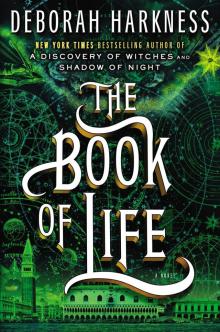 The Book of Life
The Book of Life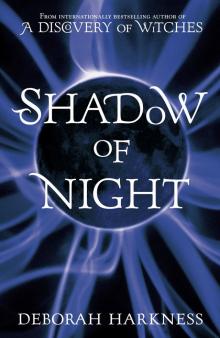 Shadow of Night
Shadow of Night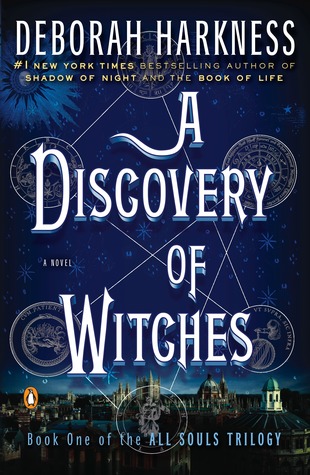 A Discovery of Witches
A Discovery of Witches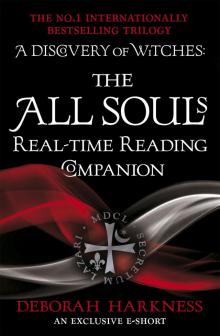 The All Souls Real-Time Reading Companion
The All Souls Real-Time Reading Companion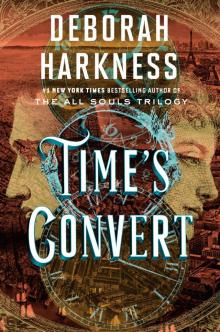 Time's Convert
Time's Convert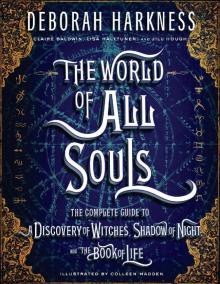 The World of All Souls
The World of All Souls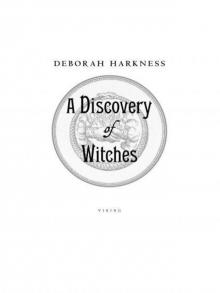 A Discovery of Witches: A Novel (All Souls Trilogy)
A Discovery of Witches: A Novel (All Souls Trilogy)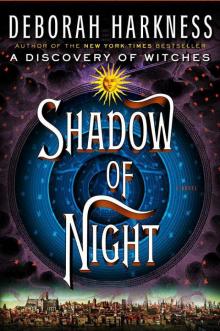 Shadow of Night: A Novel
Shadow of Night: A Novel